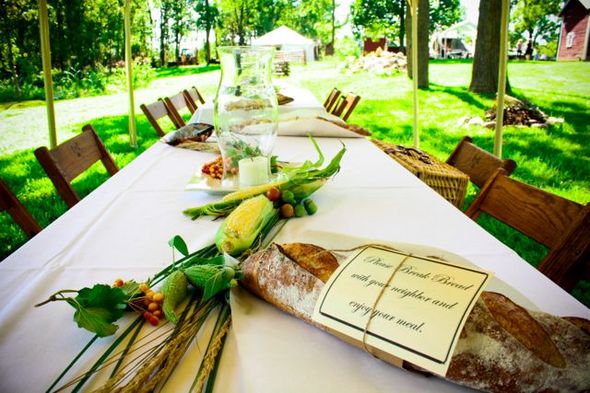Tasting Michigan's Food History at the Waterloo Farm Museum on Aug. 19

At the 2011 Picnic at the Waterloo Farm, diners were invited to break loaves provided Mill Pond Bread.
Photo by Randy Gladstone
Chefs Dan Vernia of The Raven's Club and Brandon Johns of Grange Kitchen and Bar may duke it out (culinarily speaking, of course) to draw customers to their Main Street area restaurants during the week, but on the weekend you'll often find these hard-working chefs supporting the same local non-profits together. Both of them have been drawn into the local food movement, volunteering to help local farmers and supporting the Slow Food ethos of good food for everyone.
In fact, on Sunday, Aug. 19, they're joining forces with John Savanna of Mill Pond Bread to create an experience of Michigan's historic foodways at the Sunday Picnic at the Farm in Waterloo, about a half hour from Ann Arbor.
In the historic setting of the Realy Farm, they'll be creating a menu that represents both indigenous foods — with corn, maple, turkey, wild rice and chestnuts — and "settler" foods that were introduced when Europeans arrived, like pork, sauerkraut, lemonade and ice cream. (Disclosure: I am on the board of Slow Food Huron Valley, one of the event sponsors).
Also helping with this event are Jan and Dan Longone, who created the peerless Janice B. Longone Culinary Archive at the University of MIchigan's Clements Library. Last year Jan talked about Michigan's culinary history and moderated an "antiques roadshow" — explaining the use of ancient kitchen tools that we no longer recognize. She has agreed to appear again, and will identify (if possible) the culinary oddments that may have been left behind by the great-grandmothers in the community.
The Sunday Picnic at the Farm is an experience of Michigan's rural and agricultural history, and an event that offers a peek into how history shaped and was shaped by what people ate. The setting of the Realy Farm, which has become the Waterloo Farm Musuem, is like a mini-Greenfield Village. The one-room log cabin, similar to the one where the family first lived, is still used to demonstrate open hearth cooking. Near the door stands a hollowed log that comes with an amazing story. It was presented to the settlers, filled with food, in gratitude by the family of a young native woman whom they sheltered over a harsh winter.
The brick farmhouse that the Realy family eventually built with their farming and apple orchard income has newer technology — like the wood burning stove and butter churns that they used for cooking until late in the 20th century. The milk house, the bake house, the ice house, the barns and the windmill all look as though the family might have left to go to town not long ago.
The farm will come alive again on Sunday, Aug. 19 with music, old-time lawn games, demonstrations of lost arts like ice cream making and corn grinding, and of course the smell of amazing food in the air.
The Waterloo Farm Museum is nestled into a crook in the road next to Markla Lake where the ice was once cut in blocks to fill the ice house. That ice was used to freeze sweet cream in hand-cranked ice cream makers like the ones you'll get to try. Tickets are still available for Sunday, Aug. 19 from 4-7 p.m. as area residents will be picnicking, exploring, and tasting the connection to our historic past.
Kim Bayer is a freelance writer and culinary researcher. Email her at kimbayer at gmail dot com.


Comments
Sarah Rigg
Wed, Aug 15, 2012 : 12:42 p.m.
She was a source of wonderful quotes, wasn't she? I recall that asked about her longevity, she attributed it to "meat and gin."